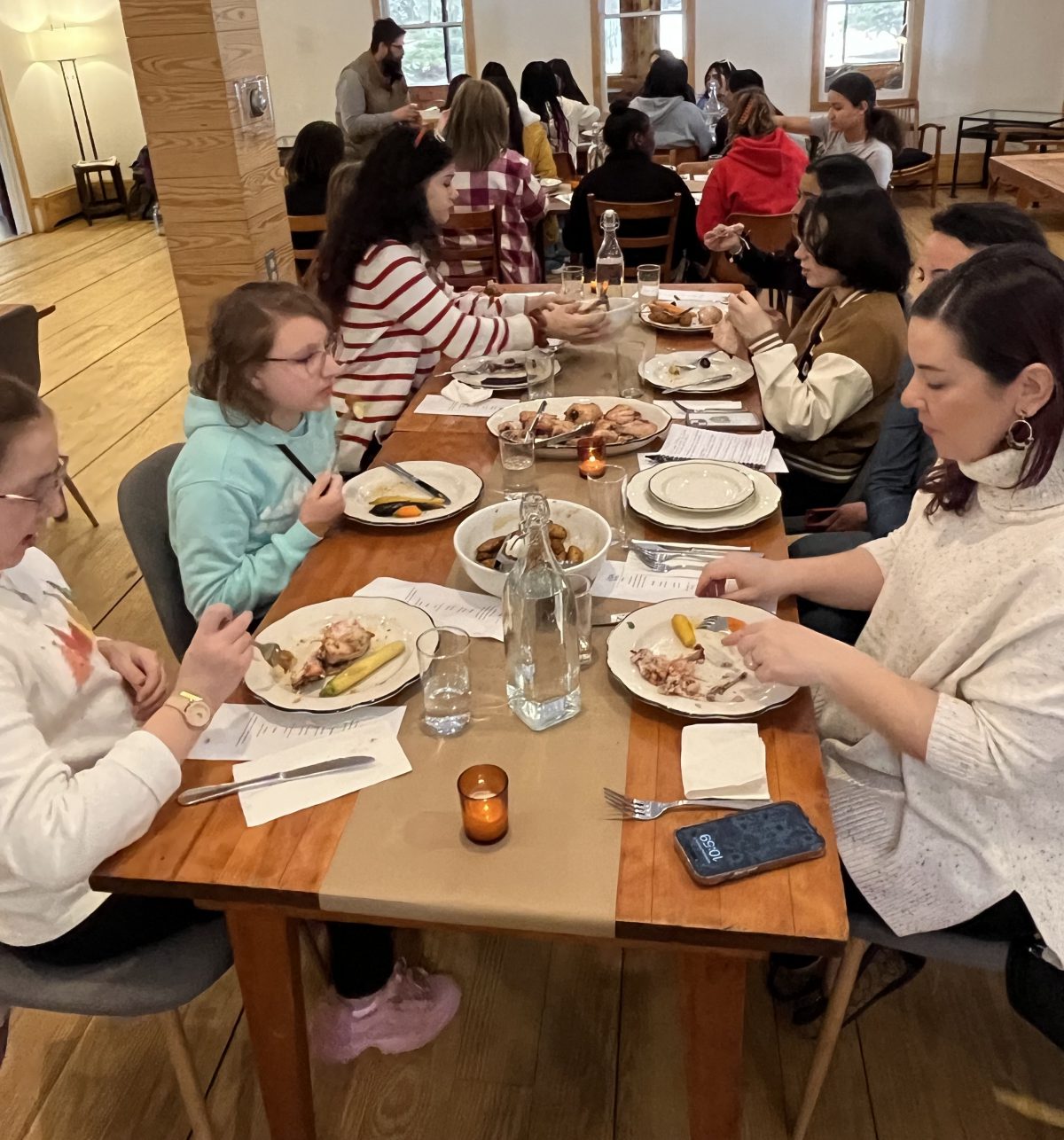Month: March 2023
Liberty seeking Request for Proposals for UPK partners
Liberty Central School District is looking to expand its pre-kindergarten program to a Universal Pre-Kindergarten program by partnering with organizations in the community. Below and at this link are the request for proposals, outlining details of the program:
Request for Proposal of Universal Pre-Kindergarten Program
1. Introduction
A. General
The District is requesting proposals from eligible agencies interested in contracting with the District for the provision of Universal Pre-Kindergarten Programs.
There is no expressed or implied obligation for the District to reimburse responding firm or individual for any expenses incurred in preparing proposals in response to this request.
To be considered, three copies of a proposal must be received by 2 p.m. April 28, 2023. These copies should be sent to Liberty Central School, Attention: Ms. Tania DeFrank, District Clerk, 115 Buckley St., Liberty, New York 12574.
The Liberty Central School District reserves the right to reject any or all proposals submitted.
During the evaluation process, the District reserves the right, where it may serve the School District’s best interest, to request additional information and clarification from proposers, or to allow correction of errors or omissions. At the discretion of the Liberty Central School District, eligible agencies submitting proposals may be requested to make oral presentations as part of the valuation process at a time determined by the District. The District anticipates that the selection of an eligible agency will be completed by lend of May 2023.
B. TERMS OF ENGAGEMENT
A one-year contract is contemplated with one or more eligible agencies, subject to annual review and recommendation of the Superintendent of Schools and the Board of Education. The District anticipates that provision of UPK services will commence on or about Sept. 7, 2023. The District shall conduct at a minimum one site visit to settings where the universal prekindergarten program will be located prior to contracting for services.
II. NATURE OF THE SERVICE REQUIRED
A. SCOPE OF THE WORK TO BE PERFORMED.
- Provision of a developmentally appropriate Universal Pre-Kindergarten Program (UPK). The chosen UPK provider will provide UPK services that meet uniform quality standards established by and in accordance with New York State Education Law and Commissioner’s regulations. These include but are not limited to the following:
- UPK Programs must be in session for a minimum of 2.5 hours per day, five days per week for a minimum of 180 days per school year.
UPK Programs will serve children eligible to enter Kindergarten in September 2024. - UPK Programs must implement curricula that are aligned with the State learning standards that ensure continuity with instruction in the early elementary grades and is integrated with the district’s instructional program in kindergarten through grade 12.
- UPK Programs will provide an early literacy and emergent reading instruction based on effective, evidence-based practices.
- UPK Programs will meet the social, cognitive, linguistic, emotional, cultural, and physical needs of the children.
- UPK Programs will include and integrate preschool children with disabilities.
- UPK Programs will provide support services.
- UPK Programs will utilize student learning centers.
- UPK Programs will ensure parental involvement.
- UPK Programs will provide meals and snacks.
- UPK Programs will ensure that students with limited English proficiency are provided equal access to the program and opportunities to achieve the same program goals and standards as other participating children.
- UPK Programs will establish and use an assessment process approved by the District that will allow the District to annually monitor and track the UPK Programs.
- UPK Programs must be in session for a minimum of 2.5 hours per day, five days per week for a minimum of 180 days per school year.
B. STAFF QUALIFICATIONS:
- Teachers must be certified according to Part 80 of the Regulations of the Commissioner of Education for early elementary grades and be Highly Qualified under the No Child Left Behind Act (NCLB).
- Teacher assistants must meet the requirements of Part 80.5 of the Regulations of the Commissioner of Education and be Highly Qualified under the No Child Left Behind Act (NCLB).
Teacher aides must meet requirements of Part 80.5 of the Regulations of the Commissioner of Education and be Highly Qualified under the No Child Left Behind Act (NCLB). - Professional staff must be evaluated at least annually.
- Staff development must be provided.
C. FACILITIES REQUIREMENTS:
All buildings, premises, equipment and furnishings used for Universal Pre-Kindergarten Program must be safe and suitable for the comfort and care of children, comply with all applicable requirements of the Americans with Disabilities Act, and be provided and maintained in a state of good repair and sanitation.
Facilities used for UPK classes must meet the requirements set forth in Section 151-1.10 of the Regulations of the Commissioner (8NYCRR).
D. RESPONSIBILITIES OF THE LIBERTY CENTRAL SCHOOL DISTRICT
- Actively supervise all sites
- Monitor compliance with all fiscal and program requirements
- Control enrollment; and
- Define staff development, methodologies, and assessments.
III. PROPOSAL INFORMATION
Proposals should include the following:
- A description of the services to be provided by the eligible agency;
- A detailed narrative which describes how the eligible agency proposes to meet the goals and objectives of the District’s Pre-Kindergarten Program;
- A description of the eligible agency’s staff qualifications, staffing patterns, child-staff ratio, and administrative structure;
- The number of students that will be served;
- A budget of proposed expenditures for services rendered;
- Signed Non-Collusive Bidding Certification and Certificate of Compliance with Iran Divestment Act of 2012; and
- Completed Parents’ Bill of Rights for Data Privacy and Security, Parents’ Bill of Rights – Supplemental Information Addendum, and Data Security and Privacy Plan.
Upon review of the proposals submitted the district will evaluate each of the proposals using a rubric to determine the successful proposal. The eligible agency or agencies shall be selected to collaborate with the district, based on criteria, including but not limited to:
- The eligible agency’s capacity to effectively, efficiently and immediately provide needed services;
- The ease of utilization and accessibility of the program to parents and/or guardians;
- Capacity to provide ongoing staff development;
- Staffing patterns and qualifications;
- Documentation that all applicable health and safety codes and licensure or registration requirements are met;
- Anticipated fiscal share and other resources will be contributed to the Universal Pre-Kindergarten Program;
- Current program design and experience in providing developmentally-appropriate programs;
- Fiscal solvency;
- Stability of staff, rate of turnover and ability to fill vacancies in a timely manner;
- Articulated mission/philosophy statements;
- Record management and documentation procedures followed by the agency;
- Administrative structure;
- Capacity and experience in serving children with disabilities;
- Capacity and experience in serving children and their parents and/or guardians when they are limited English proficient;
- Children’s progress as demonstrated by assessments; and
- Demonstrated effectiveness of the eligible agency’s program.
IV. REQUEST FOR PROPOSAL AND CONTRACT INFORMATION
- Questions regarding this Request for Proposals must be submitted in writing no later than April 14, 2023 , to: Lynnette Brunger, Assistant Superintendent, at lbrunger@libertyk12.org
- It is the policy of the Liberty Central School District to provide Equal Employment Opportunity.
- The contract will not necessarily be awarded to the lowest cost proposal, but to the proposal that best meets the needs and interests of the District and its students. All proposals will be reviewed for a recommendation to the Board of Education.
Respectfully submitted,
Name of Firm
By:
Authorized Signature
Printed/Typed Name
Title
Dated
Sworn to before me this _____________________ day of ___________________ 2023
_______________________________
Notary Public
INSURANCE REQUIREMENTS:
- Prior to any cancellation of, or material change in the policies certified to on this certificate, 30 days written notice, by certified mail, return receipt requested, shall be sent to the Business Office, prior to the effective date of such change or cancellation.
- Each certificate shall include Owner Liberty Central School District as “Additional Insured”.
- Workmen’s Compensation and Employers Liability Insurance – Statutory Workmen’s Compensation and Employers Liability insurance coverage as required by the State Law in which the project site is located, and in the state in which the contractor is domicile, and licensed to do business, and for all of his employees to be engaged in work on the project under this contract, and in case such work is sublet, the Contractor shall require the subcontractor similarly to provide Workmen’s Compensation and Employer’s Liability insurance for all of the latter employees to be engaged in such work. The policy shall contain the New York Amendatory Endorsement for Part II.
- Commercial General Liability Insurance including Premise/Operations, Independent Contractors, Products and completed Operations, Broad Form Property Damage, Broad From Liability endorsement and blanket coverage for the underground hazards; X (explosion) C (collapse) U (underground). Minimum limit: $1,000,000.00
- Umbrella Liability. Limit $1,000,000.00 per occurrence and $1,000,000.00 aggregate coverage excess over Underlying Commercial General Liability, Automobile Liability, and Employers’ Liability Policies.
END OF FORM
Seventh graders get tasty lessons on healthy eating
Liberty Middle School seventh grade students recently learned about the health benefits of consuming local foods and the farm-to-table philosophy thanks to Foster Hospitality and its nonprofit, A Single Bite.
This is the second year LMS and A Single Bite have partnered in this program, which is coordinated by Sara Hazlenis, a LCS alumna.
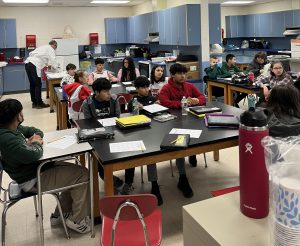 “This program is a great way for students to see different foods that are produced locally, and get them out of their comfort zone by trying new foods that are prepared fresh,” said seventh grade health and PE teacher Rich Feeney.
“This program is a great way for students to see different foods that are produced locally, and get them out of their comfort zone by trying new foods that are prepared fresh,” said seventh grade health and PE teacher Rich Feeney.
In January, Kyle Goldstein, A Single Bite presenter and LCS alumnus, visited classes and discussed health and nutrition related statistics for New York state and Sullivan County. Chef Peter Yurasits prepared three “bites” for students to taste and then discuss characteristics of each with their classmates. All ingredients came from different areas of the county, and each student was encouraged to try “A Single Bite” of each snack.
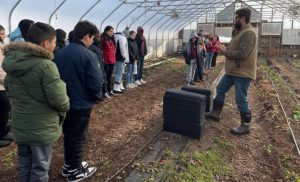 The bites included cheddar cheese on a Granny Smith apple, smoked trout on cucumber, and a potato pancake with applesauce.
The bites included cheddar cheese on a Granny Smith apple, smoked trout on cucumber, and a potato pancake with applesauce.
Students then took a field trip to Sprouting Dreams Farms in February where they were given the opportunity to explore the grounds with farmer Eugene Thalmann. He discussed goal setting and using resources, as well as conducted a tour of his vegetable farm, which includes three greenhouses that he discussed the purpose for each during the tour. Students sampled a few greens fresh from the garden and enjoyed the company of the farm dog, Loki.
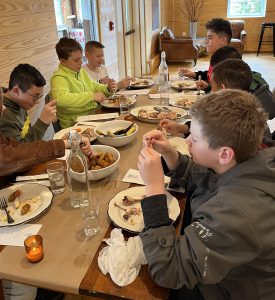 The following week, students were treated to a farm-to-table, family-style lunch at The Arnold House. The meal included fresh salad, roasted chicken, carrots, fingerling potatoes and a lemon honey tart. All ingredients were locally produced and freshly prepared. Students discussed the tastes, smells and textures of the food while enjoying the meal. After each course, the chef shared with the students where the food came from and how it was prepared.
The following week, students were treated to a farm-to-table, family-style lunch at The Arnold House. The meal included fresh salad, roasted chicken, carrots, fingerling potatoes and a lemon honey tart. All ingredients were locally produced and freshly prepared. Students discussed the tastes, smells and textures of the food while enjoying the meal. After each course, the chef shared with the students where the food came from and how it was prepared.
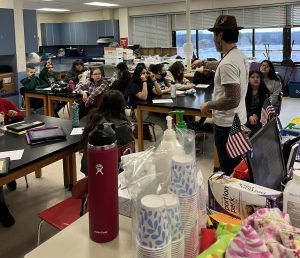 Goldstein returned to the Liberty classrooms mid-February to recap the field trips as well as discuss the difference between real versus processed foods, as well as health benefits. Yurasits prepared three more snacks for the class, and they were asked to once again try “A Single Bite” while describing the food. The bites included parsnip soup, venison summer sausage on a sweet potato chip, and a garlic scape on a roasted carrot.
Goldstein returned to the Liberty classrooms mid-February to recap the field trips as well as discuss the difference between real versus processed foods, as well as health benefits. Yurasits prepared three more snacks for the class, and they were asked to once again try “A Single Bite” while describing the food. The bites included parsnip soup, venison summer sausage on a sweet potato chip, and a garlic scape on a roasted carrot.
“It was a great experience,” student Tyler Juron said, “because we learned about local foods and got to eat an amazing lunch.”
Goals are more powerful than wishes
How Liberty schools use goal-setting for improvement
A wish is something we hope happens. A goal is something we make happen. The main difference between wishes and goals are: clear purpose, effort and priority.
Goal-setting is an integral part of the Leader in Me program, which Liberty has instituted in all of its buildings.
This year, elementary and middle school students have begun setting Wildly Important Goals, or WIGs. SMART goals have been a feature at the high school level for several years. In each case, these goals are those determined to be more important than all others. They are specific, measurable and realistic and can be personal or academic.
But setting the goal is only the first step.
Once a goal is identified, action steps are planned to help reach that goal.
For example, an elementary student’s WIG may be to read a chapter book each month. The student decides that goal can be achieved by reading 20 minutes each night. That task, known as a lead measure, can be used to track progress each day. This is habit building.
At the elementary school, goals can be academic, behavioral or social, and generally focus on the individual student. Although the goal may be personalized, the progress is shared with a partner, group, class or building. At LES, there are school-wide, classroom and individual student goals.
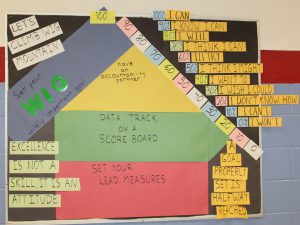
Sharing your progress toward a goal is important, according to LES Principal Robert England. “Letting your accountability partners know how you are doing is key. When students know that other people are invested in their daily progress, students are more likely to change their behaviors to achieve their goals. Eventually, these healthy behaviors turn into self-sustaining habits for long term wellness.”
At the middle school, the WIG starts at the building level: ”By May 2023, 80% of grade 5-8 students’ current Student Growth Percentile will be at or above proficiency level (25+) as evidenced by the Spring 2023 STAR Assessment in Reading.”
Each student’s goal is set using the STAR assessment given at the beginning of the year. The assessment breaks down each student’s progress and offers areas on which a student can improve. The students set their WIGs and list at least two things (lead measures) that can be used to help them reach that goal, such as taking notes during daily reading or effectively logging their reading time. Students will be reviewing their new STAR Assessment data from this winter to update their WIGs and Lead Measures.
A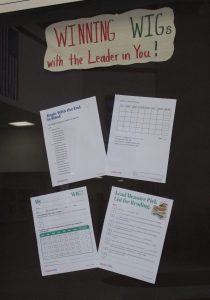 t LMS, time is set aside during classes to focus on the individual WIGs, and the teachers track the time spent. The time spent is compiled by grade on a google form. The tracking also makes it more fun for students, there is a schoolwide scoreboard displayed in the lobby and grade levels are celebrated at the monthly LIM DEAL (Leader in Me Drop Everything and Lead) Assemblies, said LMS Principal Heather Cheh.
t LMS, time is set aside during classes to focus on the individual WIGs, and the teachers track the time spent. The time spent is compiled by grade on a google form. The tracking also makes it more fun for students, there is a schoolwide scoreboard displayed in the lobby and grade levels are celebrated at the monthly LIM DEAL (Leader in Me Drop Everything and Lead) Assemblies, said LMS Principal Heather Cheh.
At the high school level, goal-setting is done slightly differently, using Specific, Measureable, Attainable, Relevant, Time Bound goals, which encompass the same dynamics of WIGs.
The high school has been using SMART goals since the Professional Learning Community model was introduced a few years ago. Each Content Teacher Team, those who teach the same course, has a SMART goal. Tracking progress is specific to each goal, but is accomplished through common assessments and data analysis.
Each level of goal-setting builds on the others.
When students do better, classrooms do better, then grade-levels do better, and the building does better, and eventually the district, as a whole, will see improvement.
These improvements could be academic, behavioral or social. Improvement in all three helps make for a better community schoolwide.


